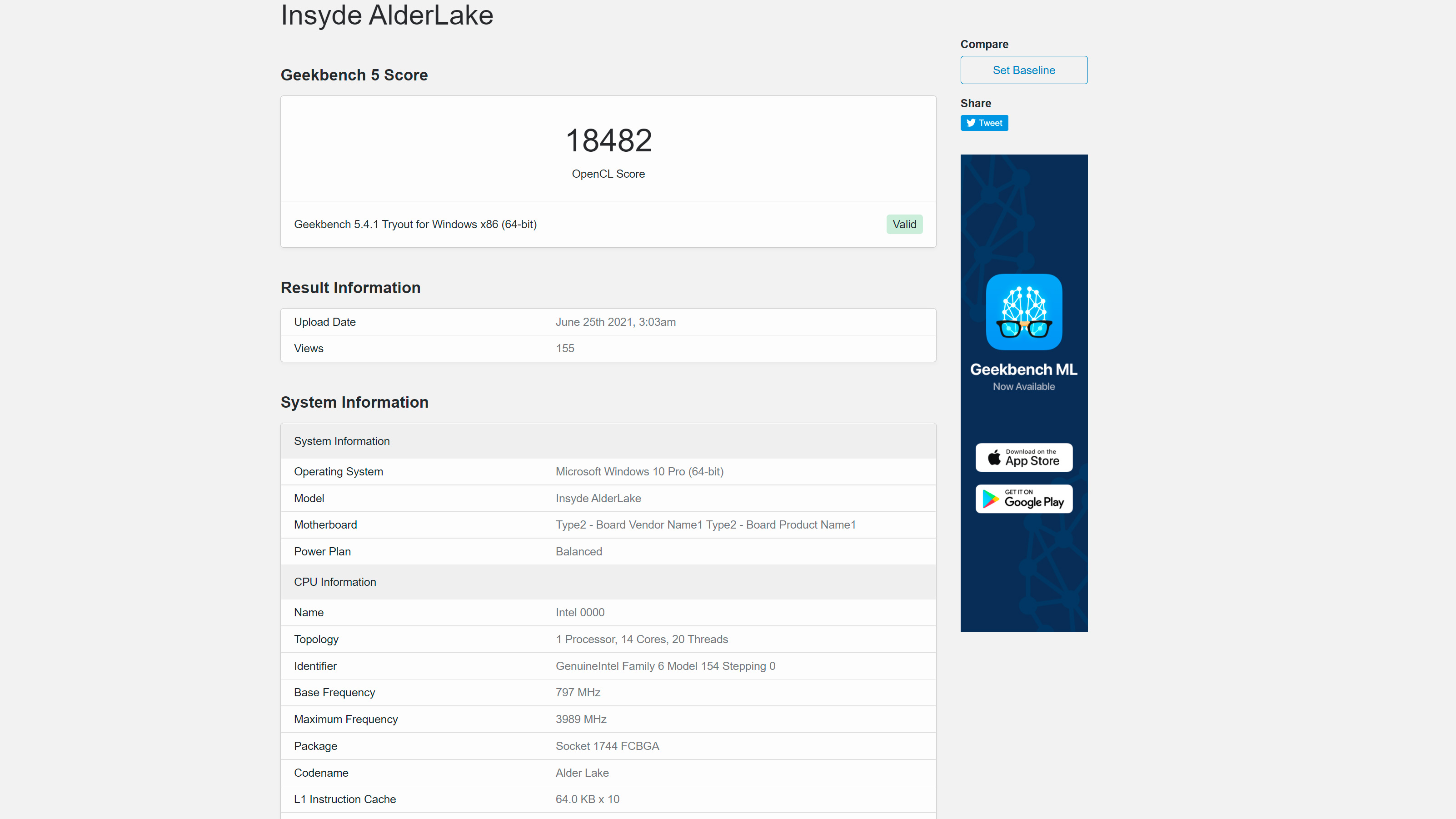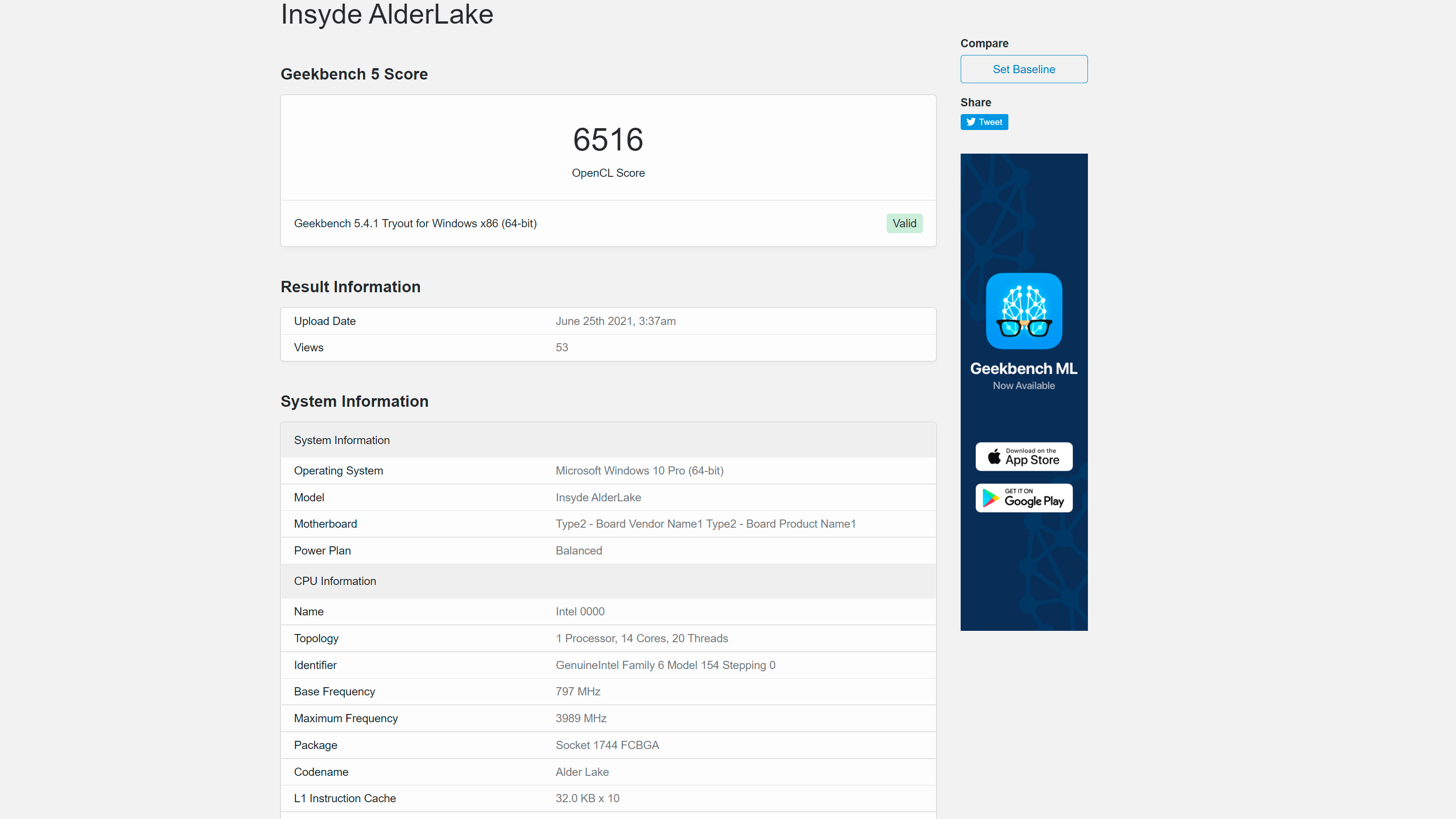Intel's DG2 GPU Shows GTX 1050-Like Performance in Early Benchmarks
Two new benchmarks for upcoming Intel's DG2 GPU emerged today, pointing to performance similar to that of Nvidia's dated GeForce GTX 1050.
One of the benchmarks (via Leakbench) points to the discrete variant, while the other (via Benchleaks) is likely the integrated solution for Intel's upcoming 12th Generation Alder Lake CPUs. Insyde, a renown UEFI maker, performed the tests, giving them some credibility, but we still recommend approaching the results with caution because of early drivers, thermal limits and other factors likely affecting performance.
The first DG2 submission exposed a discrete graphics card with 256 execution units (EUs) and a maximum frequency of 1,400 MHz. The specifications match those of one of the rumored DG2 variants. Although the rumor pointed to 8GB of GDDR6 memory, the DG2 from the Geekbench 5 benchmark had 6.22GB.
The DG2 graphics card scored 18,482 points in OpenCL. According to the official Geekbench 5 ranking, the GeForce GTX 1050 is able to post a score of 18,230-18,895. Therefore, the DG2's performance is right up the Pascal graphics card's alley.


The second DG2 submission detected the GPU with only 96 EUs with a maximum clock speed of 1,200 MHz. Given the EU count and the 1.5GB memory, we suspect this is an iGPU. Even before this benchmark, there were already rumors that Intel will pair the DG2 with its upcoming Alder Lake-P chips.
This variant raked in a score of 6,516 points, so its performance is slightly lower than that of a GeForce GTX 460.
Both DG2 units emerged alongside a 14-core, 20-thread Alder Lake processor. So we suspect it's the mobile variant (Alder Lake-P). The FCBGA package from the submission tells us that Insyde is probably working on a system validation platform (SVP), which is essentially a desktop motherboard.
Get Tom's Hardware's best news and in-depth reviews, straight to your inbox.
The Alder Lake-P part reportedly features a 797 MHz base clock and 3,989 MHz boost clock. The drastic variation in clock speeds is due to the hybrid design with the Golden Cove and Gracemont cores.
The fact that Insyde is already validating Alder Lake support on its products shows that Intel's new 12th Generation lineup is marching along just fine. In fact, Alder Lake is very close to hitting the market since outside manufacturers, such as Insyde, don't get access to hardware until the latter stages of development.
We won't know if Alder Lake can compete with the best CPUs until its official launch. Intel hasn't confirmed a concrete date, but we're expecting a late 2021 or early 2022 debut.

Zhiye Liu is a news editor, memory reviewer, and SSD tester at Tom’s Hardware. Although he loves everything that’s hardware, he has a soft spot for CPUs, GPUs, and RAM.
-
Howardohyea I'm actually very interested in seeing all the large semiconductor companies all making GPUs (Intel, Nvidia, AMD).Reply
Can't wait to see benchmarks for the actual production chips and reviews -
InvalidError Reply
Based on DG1 benchmarks assuming nearly perfect scaling with EU count and clocks, the top-end DG2 part might land in the RTX3060Ti's neighbourhood, which would be decent if the rumoured $300 MSRP is accurate.Howardohyea said:Can't wait to see benchmarks for the actual production chips and reviews -
Matt_ogu812 I have a EVGA GTX1050 Ti in my system that I built about a year ago which I used because it was new and free.Reply
My first though when I read that Intel's first stab at a graphics card is already outdated is, why bother.
I'm chomping at the bit to get a new video card but not at these shark infested prices.
I'd settle for a RTX2060 right now. But given the feeding frenzy in the GPU market I'll continue to wait. -
TCA_ChinChin Reply
I think RTX3060ti performance is wishful thinking, but any competition is better than none.InvalidError said:Based on DG1 benchmarks assuming nearly perfect scaling with EU count and clocks, the top-end DG2 part might land in the RTX3060Ti's neighbourhood, which would be decent if the rumoured $300 MSRP is accurate. -
usiname Reply
If they scale linear and if we start from the asus variant that Steve from Gamers Nexus tested (80eu according his review, 96eu according ETA PRIME ) we have 10nm 80 or 96eu, 30W and 70GB/s bandwidth vs gt 1030, 30W, 14nm, 50GB/s bandwidth. The asus variant lose to 5 years old architecture with full node advantage and with 40% faster memory, this is not Pascal level, this is not even Maxwell, its more like Kepler level and if the 512eu variant is TSMC6nm and 230W maybe will be close to 1080ti, but if the 512eu variant is 10nm intel, even gtx 1080 will be to fast to catch.InvalidError said:Based on DG1 benchmarks assuming nearly perfect scaling with EU count and clocks, the top-end DG2 part might land in the RTX3060Ti's neighbourhood, which would be decent if the rumoured $300 MSRP is accurate.
edit: I forgot that the intel 10nm has same density as 7nm TSMC, which mean that the situation with the Asus variant is even worse and even 6nmTSMC woth help much, so maybe 1070 ti level -
TerryLaze Reply
I doubt that theoretical max bandwidth of lpddr4x is applicable here, did any of the sites do an actual bandwidth test?!usiname said:we have 10nm 80 or 96eu, 30W and 70GB/s bandwidth vs gt 1030, 30W, 14nm, 50GB/s bandwidth. The asus variant lose to 5 years old architecture with full node advantage and with 40% faster memory,
Also the dg1 has hardware acceleration that lacks from the nvidia/amd offerings of the same tier so there is going to be a market for them even if they suck at gaming. -
Joseph_138 If GTX 1050, and GTX 460 level performance is the best Intel can do, they should stick to making CPU's and chipsets.Reply -
hannibal Reply
Why? When they can print money by making gpus!Joseph_138 said:If GTX 1050, and GTX 460 level performance is the best Intel can do, they should stick to making CPU's and chipsets.
It may not be for you or me, but there are enough customers to these! -
rluker5 Reply
DG will probably be higher. This integrated geekbench score is slightly over my haswell iris I just ran on a locked hp office mobo with 1333 ram: https://browser.geekbench.com/v5/compute/3030766I'm pretty sure multiplying it by 2 would be safe for a proper benchmark. Maybe 3 or 4? depending on arch improvements since 2013.InvalidError said:Based on DG1 benchmarks assuming nearly perfect scaling with EU count and clocks, the top-end DG2 part might land in the RTX3060Ti's neighbourhood, which would be decent if the rumoured $300 MSRP is accurate.
Edit: my gpu was throttling due to a 47w max tdp so I had to reduce the clocks and volts a bit and here: https://browser.geekbench.com/v5/compute/30308236545 from 47w haswell that is still throttling a bit. Pretty sure more than double the EUs on less than half the nm node from seven years later can do better. -
rluker5 If you look further up on the G5 opencl list there are a couple of 96 EU XE max at 22k, just above a 1050ti.Reply